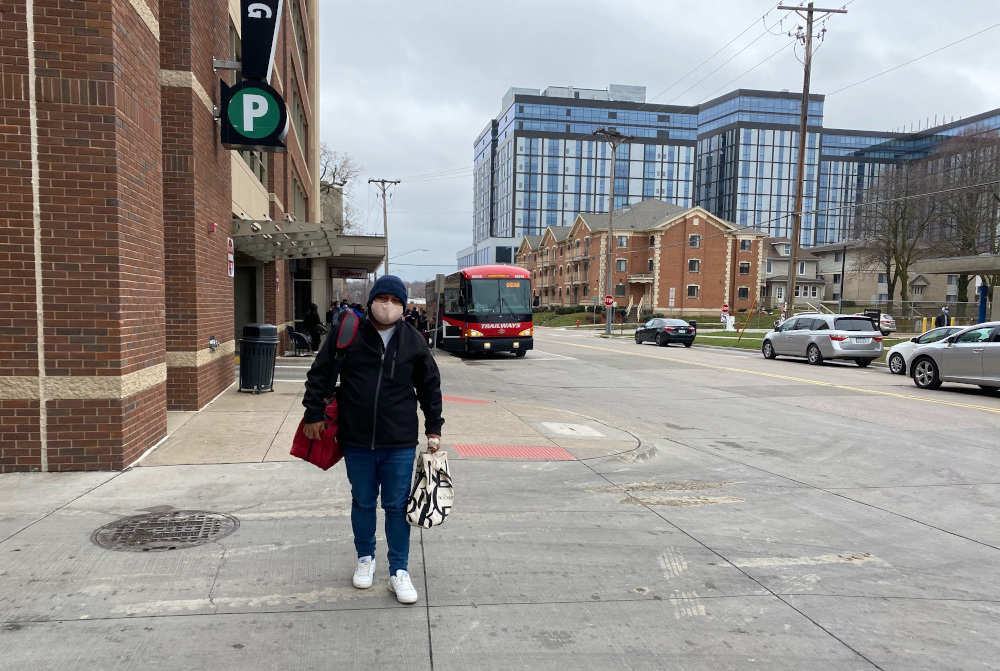
Alejandro Cortez Amaya arrives at an Iowa City bus depot on May 26 after making the journey from El Paso, Texas, to reunite with his son. (Photo courtesy of Emily Sinnwell)
Alejandro Cortez Amaya and his wife Juliza left El Salvador because of the threat of gang violence there. But when they arrived at the U.S. border, they were separated. Juliza, then eight months pregnant, was allowed in, while Alejandro was forced to wait in Mexico for his asylum case to be heard.
Now, thanks to the Biden administration's decision to phase out the Migrant Protection Protocols (MPP) policy, more commonly known "Remain in Mexico," those with active MPP cases are slowly being admitted, and Cortez Amaya has finally been allowed to enter the country.
When NCR spoke to Cortez Amaya hours after he crossed the border, he could hardly believe he was in the United States. "I slept a little bit today and am waking up, just wondering if this is real," he said.
On March 26, he was reunited with son Anderson, who is now almost 2 years old. It was only their second-ever meeting. The family had had a brief reunion at a courthouse in El Paso, Texas, in November 2019 — facilitated by the Iowa City Catholic Workers with whom Juliza had been staying — but it lasted only minutes.
Parting with his son after seeing him for the first time was the hardest thing Cortez Amaya has ever had to do, he told NCR. "I only got to see him for five minutes. I had never planned for it to be like this," he said.
A video published last month by Human Rights Watch included photos from the meeting and highlighted the emotional toll of the separation.
Crossing the border into the United States on March 24, Cortez Amaya felt ecstatic that he would get to see his son again, he said. "I felt so happy that I was finally able to do it with the help of God and the help of the Catholic Worker. I felt super happy knowing that I would be able to see my son and that I would be able to be with him for his birthday," Cortez Amaya said. Anderson turns 2 in June.
Advertisement
Since she arrived in the United States in April 2019, Juliza has been living at the Catholic Worker House in Iowa City.
While Cortez Amaya was waiting in Mexico, the Catholic Worker provided him mental, emotional and financial support. Because of the pandemic, he was usually not able to work, and spent much of his time isolated from others. His phone conversations and text messages with Catholic Worker volunteers helped him to maintain hope, he said.
"I've been talking to Ale on the phone for the past year and a half, and it's been really hard. So that he's here is just amazing," said Emily Sinnwell, an Iowa City Catholic Worker community member who offered interpretation during NCR's interview with Cortez Amaya.
In addition to financial and emotional support, the Catholic Worker connected Cortez Amaya to his lawyer. Now that he is in Iowa City, Cortez Amaya has joined the group of asylees and refugees living at the Catholic Worker house.
"Offering hospitality to the immigrant and the stranger is the core of the Catholic faith," said Manny Galvez, an Iowa City Catholic Worker and Hispanic community leader.
The Catholic Workers were also inspired to take on the work of sponsoring refugees by Pope Francis' message for the 2019 World Day of Migrants and Refugees, as well as the pope's 2020 encyclical letter Fratelli Tutti, Galvez said.
"We have to help others who are in need. Pope Francis calls us to do it, and Jesus did it," said Sinnwell. "I think it's a moral issue. How we're treating vulnerable children and families who are at our doorstep, literally, says a lot about who we are as people, as a country."
Though some of the people currently waiting in Juárez, Mexico, try to stay inside to avoid COVID-19, many others cannot afford to do so, Cortez Amaya said. "There are just so many people right now from Honduras, from El Salvador, from Cuba. They're just in the center of town, trying to survive every day," he said.
Two of Cortez Amaya's friends who are still waiting in Juárez are in similar situations to the one he was in, he said. "Their wives were able to cross, but they were sent back. They're still waiting and haven't been able to get in," he said.








